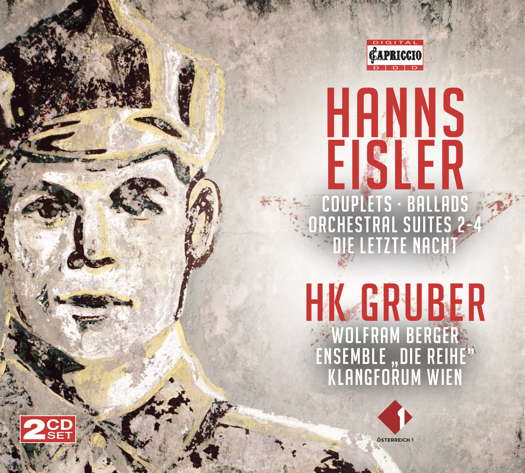 DISCUSSION: John Dante Prevedini leads a discussion about Music and the Visual World, including contributions from Celia Craig, Halida Dinova and Yekaterina Lebedeva.
DISCUSSION: John Dante Prevedini leads a discussion about Music and the Visual World, including contributions from Celia Craig, Halida Dinova and Yekaterina Lebedeva.

A Fresh Appraisal
GERALD FENECH listens to music by Hanns Eisler
'... the music is beautiful and expressive and filled with a mixture of moods that reflect the tempestuous times in which it was written.'
Hanns Eisler was born in Leipzig on 6 July 1898, the son of the Austrian philosopher Rudolph Eisler. He grew up in Vienna, but during World War I he served in a Hungarian infantry regiment while continuing his autodidactic attempts at composition that he had begun some time earlier. After the war Eisler was instructed in composition by none other than Arnold Schoenberg and Anton Webern, but Eisler was determined to follow his own path and his music, although decisively modern, is indeed different from that of his two eminent teachers. With his compositions for experimental films, radio, workers' choir, theatre and cabaret, he broke with the restrictions of traditional music genres and encountered a broad response beyond the concert hall.
Eisler's longtime collaboration with Bertolt Brecht that started in 1936 and lasted until Brecht's death in 1956 is legendary. The result of this artistic link were large-scale choral works such as The Decision and The German Symphony. During this period Eisler also produced important film music for Kuhle Wampe and Hangmen also Die as well as numerous songs and stage-works.
Unfortunately Eisler was of Jewish origins and harboured Communist sympathies, and in 1933 was forced into exile. Beginning in 1938, after stays in Paris, London, Moscow, Prague and a host of trips to Denmark and the US, Eisler finally settled in New York, where he taught at the New School for Social Research. Supported by the Rockefeller Foundation he also embarked on his famous 'Film Music Project'. In 1942 Eisler took up residence in Los Angeles where he composed film music and many of his most important songs and orchestral and chamber pieces, among them the Hollywood Songbook, the Septet No 2 after Chaplin's silent film The Circus and the Third Piano Sonata.
In 1948, Eisler got the chop once more when he was expelled from the USA because of his Soviet and Communist leanings. Still, at a farewell concert given in his honour, several prominent American colleagues such as Leonard Bernstein and Aaron Copland attended the event.
In 1950, the composer was accepted back in East Berlin, where he led master classes at the German Academy of Arts. Allegations of formalistic tendencies combined with the fierce campaign against his Faustus opera project paralyzed his creative powers, driving him into a state of resignation. Moreover, his unflinching support of Arnold Schoenberg encountered strong objections. Strangely enough, despite all these obstacles and opposition, he was still commissioned to compose the national anthem of the GDR, but his principal works were rarely performed in East Germany – and even less frequently in the West.
Eisler died on 6 September 1962 aged sixty-four, so this year marks the sixtieth anniversary of his demise. Still very much ignored, and worse, underrated, this composer is, thankfully, on the road to a fresh appraisal of his legacy, and this ongoing Capriccio cycle dedicated to Eisler's output is, to say the least, absolutely invaluable for those interested enough in discovering one of the truly great masters of the twentieth century.
This double CD set contains songs and chansons from all periods of Eisler's creative life, plus three fascinating suites that the composer mostly assembled as adaptations of film scores from the 1930s.
Listen — Eisler: Ballade von den Säckeschmeissern (4 Balladen Op 22)
(CD1 track 5, 0:00-0:58) ℗ 1996/1999 Österreichischer Rundfunk :
The highlight of this programme is certainly the world premiere recording of the incidental music for Die letzte Nacht (The Last Night) – the epilogue to Karl Kraus' monumental satirical work The Last Days of Mankind.
Listen — Eisler: Herr der Hyänen (Die letzte Nacht)
(CD2 track 19, 0:00-0:35) ℗ 1996/1999 Österreichischer Rundfunk :
This collection is not for the squeamish, but those who love delving into unfamiliar territory will find much to enjoy. Indeed, the music is beautiful and expressive and filled with a mixture of moods that reflect the tempestuous times in which it was written.
Listen — Eisler: Capriccio on Jewish folk songs (Suite for Orchestra No 2)
(CD2 track 2, 1:52-2:35) ℗ 1996/1999 Österreichischer Rundfunk :
These pieces were recorded in 1996 and 1999, but sonics still sound first-rate. Passionately detailed and atmospheric performances complete another milestone issue in the Eisler discography.
Copyright © 4 February 2022
Gerald Fenech,
Gzira, Malta

CD INFORMATION EISLER: DIE LETZTE NACHT; COUPLETS - H K GRUBER



